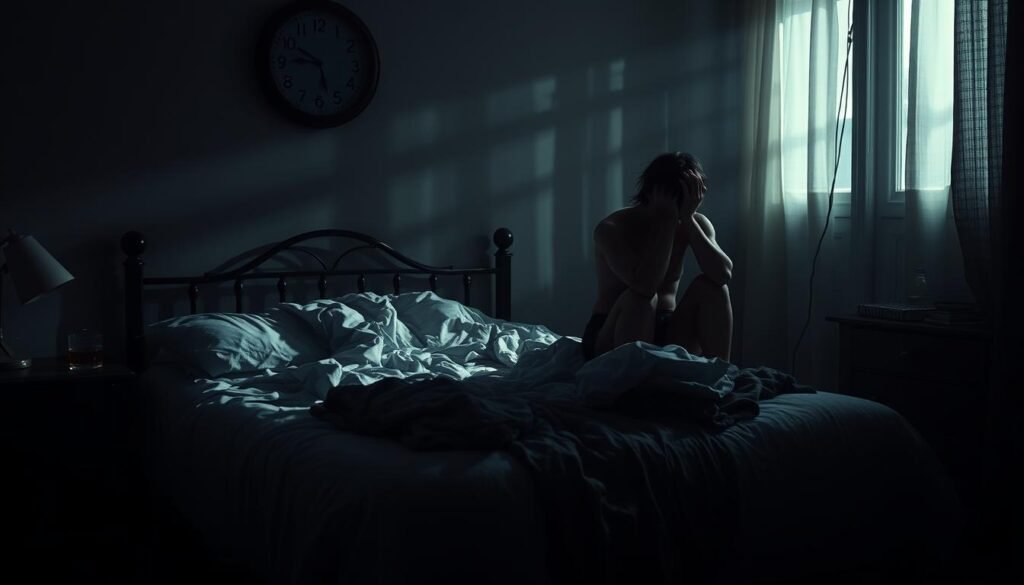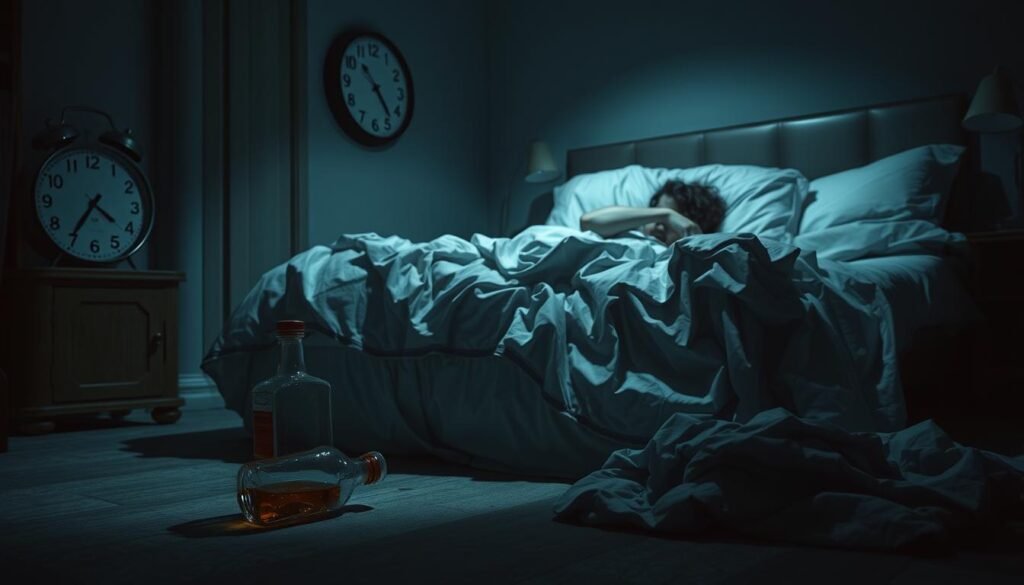Have you ever thought that your evening wine might be disrupting your sleep? Many people think alcohol helps them relax. But, the truth could be quite different. Studies show a complex link between drinking alcohol and insomnia. This condition affects a huge 33% of adults in the U.S. People often drink to sleep better. Yet, they find that it actually makes their sleep worse. Alcohol can reduce sleep quality and raise the risk of insomnia.
A lot of people who drink suffer from insomnia. Statistics show that this is between 35% and 70% of drinkers. This significant overlap is hard to ignore. This article looks into how alcohol impacts sleep. It explains how alcohol might lead to the sleep problems many face today. By understanding this better, you can see if alcohol really causes insomnia or if it’s just a mistaken solution.
Key Takeaways
- Between 35% and 70% of individuals who use alcohol have insomnia.
- Insomnia affects an estimated 33% of American adults.
- About 20-30% of those with insomnia self-treat using alcohol.
- Alcohol consumption has been linked to a 25% increased risk of obstructive sleep apnea.
- More than 70% of individuals with alcohol use disorder experience alcohol-induced sleep disorders.
- Regular drinking disrupts sleep cycles and can lead to shorter REM periods.
Understanding Insomnia
Insomnia is a big problem for many people, leading to health issues. It means you have trouble sleeping well. Spotting the insomnia symptoms matters a lot for those dealing with it. Symptoms include lying awake for a long time, waking up often, and not feeling rested.
Definition and Symptoms of Insomnia
Knowing about insomnia shows how it affects life. People feel tired during the day. This makes it hard to do well in daily tasks. Insomnia symptoms also lead to anxiety and being easily upset. This makes sleeping even harder.
Prevalence of Insomnia in the United States
In the U.S., insomnia is quite common. About one-third of adults have trouble sleeping. Of these, nearly 10% deal with short-term issues. Meanwhile, 20% suffer from ongoing insomnia. This shows many are struggling with sleep, which hurts their health and day-to-day life.
The Role of Alcohol as a Sedative
Alcohol acts as a sedative, making people feel more relaxed and sleepy at first. This happens because of how alcohol affects the brain. After a tough day, the effect can feel nice. Drinking 2 to 3 drinks before bed might help you fall asleep faster. But, this benefit doesn’t last long. People quickly get used to it, showing the tricky side of using alcohol to sleep.
How Alcohol Affects Brain Activity
Alcohol works by boosting GABA in the brain, which calms neural activity and makes you sleepy. But, using alcohol a lot can mess with your mind and change how your brain works over time. Research links drinking with sleep problems. When these issues don’t go away, it might mean alcohol dependence. This requires medical help, as shown in this study.
Short-term vs Long-term Effects of Alcohol on Sleep
In the beginning, alcohol might help you sleep. But frequent use leads to problems. Even small amounts can make your sleep worse. Drink more, and it affects sleep even more deeply. You might wake up often and miss out on good REM sleep. Over time, using alcohol to sleep can cause troubles like insomnia. This is especially true for those who drink a lot over the years.
How Does Alcohol Affect Your Sleep?
Alcohol and sleep interact in complex ways. At first, alcohol can make you sleepy and deepen your sleep. But the benefits are short-lived and lead to sleep problems later on. Grasping how alcohol works as a sedative and its effect on sleep over time explains why it often ties to insomnia.
The Initial Sedative Effects of Alcohol
Drinking a little can relax you and make you sleepy. This initial effect of alcohol on sleep makes people think it’s good for sleep. But, it actually makes sleep worse as the night goes on.
Alcohol’s Impact on Sleep Stages
Different sleep stages are key for good sleep. Studies show alcohol deeply changes these stages. It may deepen sleep early on, but it messes with REM sleep. REM sleep is important for memory and feeling well.
Regular drinkers may find:
- Less REM sleep early in the night.
- More waking up at night, which can cause headaches and sweating.
- Bad dreams and louder snoring.
Long-term, these effects can create a cycle. People drink often, then struggle with drinking and insomnia. Trying to cut back on alcohol leads to more sleep troubles. This badly affects sleep quality.
Knowing how alcohol changes sleep helps underline the importance of good sleep practices. It also shows why it’s better to find other ways to improve sleep than through alcohol.
Can Alcohol Cause Insomnia?
Drinking alcohol can really mess with your sleep, leading to insomnia and other sleep issues. Many people struggling with alcohol dependence find their sleep is wrecked. This is because of how alcohol affects the body and mind.
Research on Alcohol Dependence and Sleep Disorders
Nearly 70% of regular alcohol drinkers face insomnia symptoms. About 30% of adults use alcohol to fall asleep. For older adults, almost half drank alcohol last year, showing that many people deal with both alcohol and sleep problems. But even if 67% think alcohol helps them sleep, it actually causes more harm over time.
Binge Drinking and Sleep Disruption
Binge drinking makes sleep problems much worse. It can mess with your sleep cycle and make existing sleep disorders even harder to deal with. It also puts you at a higher risk for obstructive sleep apnea. This condition can get dangerous, leading to high carbon dioxide levels in your body. Lastly, not getting enough sleep because of heavy drinking can lead to serious health problems like stroke, obesity, and heart disease.

| Statistic | Percentage |
|---|---|
| Adults using alcohol to help sleep | 20% |
| Adults experiencing insomnia symptoms | 30% – 35% |
| Insomnia sufferers using alcohol as a sleep aid | 30% |
| Users reporting that alcohol helps with sleep | 67% |
| Individuals with insomnia who consume alcohol | 70% |
| Alcohol’s impact on risk of obstructive sleep apnea | 25% higher risk |
Effects of Alcohol on Sleep Quality
Drinking alcohol has a big impact on how well you sleep, especially on REM sleep. While it might seem like alcohol helps you fall asleep, it actually makes your sleep worse. People who drink might find their REM sleep disrupted. This kind of sleep is needed to feel rested. At first, alcohol might help you fall asleep faster. But, this benefit doesn’t last. You end up with a bad night’s sleep.
Impact on REM Sleep
REM sleep becomes more important as the night goes on. It helps with thinking and managing feelings. Drinking alcohol cuts down on REM sleep. This can make you feel cranky and confused the next day. Long-term drinking messes up sleep patterns, giving you less deep sleep and REM sleep. Those who drink a lot often have big sleep problems. There’s a clear link between drinking and poor sleep.
Long-term Sleep Quality Issues Related to Alcohol
Alcohol affects your sleep long-term, not just for one night. People who drink regularly might get insomnia and other sleep issues. About 20% of people have insomnia, and drinking makes it worse. Drinking a lot messes with sleep, making insomnia a bigger problem. This can lead to drinking more to try and sleep better. This shows how big an impact alcohol has on sleep. It’s important to understand and manage these sleep problems.
Alcohol and Sleep Apnea
The link between alcohol and sleep apnea is a big public health concern. Many people now understand how drinking alcohol can hurt sleep quality. It also makes breathing problems at night worse. Knowing this helps people see the risks of drinking alcohol if they have sleep issues.
Link Between Alcohol Consumption and Sleep Apnea
Studies show a strong connection between heavy drinking and obstructive sleep apnea (OSA). In the U.S., nearly 30% of adults suffer from OSA. This number is 25% higher in heavy drinkers. This information alarms many about the health risks for people who drink a lot.
How Alcohol Exacerbates Sleep-disordered Breathing
Drinking alcohol can make sleep-disordered breathing more serious. It makes the throat muscles relax too much. This can block airflow when you’re sleeping. If someone already has conditions like OSA, alcohol can make it worse. It means more breathing stops during the night. This hurts sleep quality and lowers oxygen levels in the blood.
Understanding Sleep Disturbance Related to Alcohol
Drinking alcohol can mess with how well you sleep. It affects your sleep deeply, changing the way you go through sleep stages. This especially impacts the deep sleep and REM sleep stages.
Mechanisms by which Alcohol Disturbs Sleep
Alcohol slows down the brain, messing up sleep. It changes neurotransmitters, which are key for good sleep. People drinking more than two drinks a day see their sleep quality drop by 39.2%.
Drinking a lot can cause insomnia or more REM sleep issues. These problems can last for more than six months. REM sleep is important for thinking clearly and managing emotions.
Alcohol’s Influence on Melatonin Release
Alcohol affects the release of melatonin, which controls our sleep cycles. It makes falling and staying asleep harder. Frequently drinking increases the risk of long-term sleep problems.
Drinks can lead to more complaints about insomnia among those addicted to alcohol. Knowing about these effects can help us sleep better and be healthier. To learn more, check out how alcohol affects sleep.
Alcohol Withdrawal and Sleep Issues
Moving from alcohol dependence to sobriety is tough, especially with sleep. When withdrawing, many see big changes in how they sleep. Insomnia often starts a night or two after you stop drinking. It leads to difficulties in recovery and well-being.
Impact of Withdrawal on Sleep Patterns
Insomnia can last for a week to 10 days at the beginning of withdrawal. Alcohol relaxes your brain, but during withdrawal, you feel too awake and can’t sleep well. Studies show that 58 percent of men with alcohol issues face insomnia in the first six days without a drink. Over half had sleep problems even before they began drinking heavily.
Long-term Recovery and Sleep Disturbances
Even after detox, sleep problems can last for weeks, months, or years. This causes anxiety, tiredness, and moodiness. People detoxing from alcohol are more likely to have insomnia than others. This time really needs medical care. Good sleep habits, like cutting out caffeine and regular exercise, help a lot. Cognitive Behavioral Therapy for Insomnia (CBT-I) is also effective for those getting over alcohol dependency. Tackling sleep issues in recovery is key to doing better and avoiding a relapse.

Managing Sleep Disturbances Related to Alcohol
Improving sleep is key for better health, especially after stopping alcohol. Many face sleep problems during recovery. Finding good sleep strategies can really help.
Strategies for Improving Sleep Quality
There are several ways to get better sleep:
- Establish a regular sleep routine: Sleeping and waking at set times tunes your body’s clock.
- Avoid alcohol several hours before bedtime: Not drinking in the evening can lead to better sleep.
- Consider behavioral therapies: CBT-I is a proven method to solve sleep issues.
- Create a comfortable sleep environment: A room that’s dark, quiet, and cool supports sleep.
- Implement relaxation techniques: Meditation or gentle yoga before bed can aid in falling asleep faster.
Consulting with Healthcare Professionals
If sleep troubles don’t improve, it’s wise to seek a doctor’s or therapist’s help. They offer custom advice for those dealing with alcohol’s aftereffects on sleep. Their support is crucial for better sleep and overall health.
| Strategy | Benefit |
|---|---|
| Regular Sleep Routine | Helps in regulating sleep patterns |
| Avoid Alcohol Before Bed | Reduces disruptions during sleep |
| Behavioral Therapies | Addresses underlying sleep disorders |
| Comfortable Sleep Environment | Enhances overall sleep quality |
| Relaxation Techniques | Promotes quicker sleep onset |
Moderation and Timing: Alcohol Consumption Tips
Drinking responsibly is key to good sleep and health. It’s vital to know how much alcohol is okay. This helps if you want to drink without hurting your sleep. Drinking too much or at the wrong time can mess up your sleep. So, it’s important to learn the right way to drink before bed.
Best Practices for Alcohol Consumption Before Sleep
There are tips to avoid bad sleep from drinking:
- Stop drinking a few hours before bed. This gives your body time to process the alcohol.
- Keep it to one drink a day for women and two for men.
- Stay away from drinking a lot at once.
- Pick drinks with fewer congeners. These can make sleep worse.
Effects of Drinking Limitations on Sleep Quality
Limiting how much you drink can make your sleep better. Studies show that not overdoing it helps you dodge insomnia. It also keeps obstructive sleep apnea away. By drinking less, you can:
- Wake up less during the night.
- Have better sleep patterns, with deep and REM sleep.
- Focus better and move more easily the next day.

Keeping to moderation and timing is smart for social drinkers. By changing how and when you drink, you can sleep well. This leads to energetic days.
Effects of Alcohol on Individuals with Insomnia
Alcohol affects people with insomnia differently. It poses more challenges for certain groups. These groups might find their sleep problems get worse with drinking.
Demographics at Higher Risk for Sleep Problems
Some people are more likely to have sleep troubles from alcohol, especially if they already struggle with insomnia. Studies show that:
- Older adults often see their sleep troubles worsen with alcohol use.
- People with mental health issues like depression and anxiety face more risks. They find themselves in a tough cycle of mental health and drinking.
- Individuals going through tough times might use alcohol to relax. But, they might not know this can make demographics and insomnia worse.
Interactions between Alcohol Use and Mental Health
The link between alcohol and mental health is complicated. Many drink to ease insomnia or mental health woes. This can start a harmful cycle, leading to:
- More anxiety and worse insomnia as alcohol messes with the brain’s chemicals.
- Reduced quality of sleep, particularly less REM sleep.
- Hard times for those trying to stop drinking. They might face weeks of insomnia as a withdrawal symptom.
To tackle insomnia at its root, it’s crucial to understand these relationships. Helping improve sleep habits and mental health can break the cycle. This approach helps people find peaceful sleep without relying on alcohol.
Conclusion
Alcohol-related insomnia is a growing concern. It shows how drinking can really hurt our sleep. Studies have found that more than half of adults in the U.S. drink alcohol. Sadly, many of them have trouble sleeping. People with alcohol use disorder (AUD) face a high chance of insomnia. This ranges from 36% to 91%, way more than the general 10%.
Heavy drinking makes sleeping even harder. If someone drinks five or more drinks a day, they’ll likely find it tough to fall asleep. Their sleep quality worsens, especially the REM stages which are crucial. Teenagers are also affected. They feel overly tired and find it hard to fall asleep. This info shows why drinking less is important for our sleep and mental health.
We should drink responsibly. Understanding how drinking affects our sleep can help us make better choices. This could mean sticking to a regular sleep schedule or not having caffeine late in the day. Knowing the risks that come with alcohol can help us sleep better. This leads to better health and happiness.